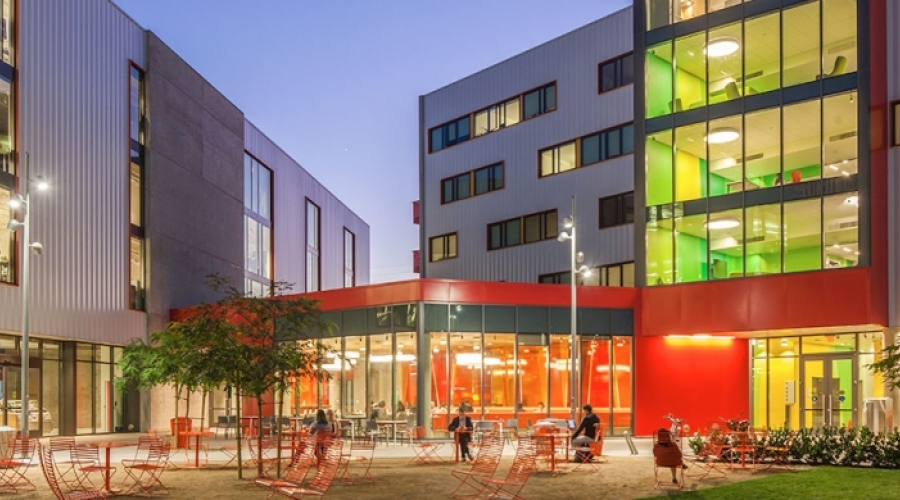Earth Day 2018: Exploring Otis College’s LEED Platinum Certified Campus

With the construction of the Residence Hall and Academic Wing, the College worked with the teams at Ehrlich Architects and Frederick Fisher and Partners to ensure the new buildings and landscaping met Leadership in Energy and Environmental Design (LEED) platinum standards. LEED is the most widely used green building rating system in the world and offers four levels of certification. LEED platinum certification is the highest level of LEED certification that can be achieved, with certification requiring buildings to hit 80 points of environmentally conscious design for such categories as energy use and air quality, among others. Otis College achieved 83 points, exceeding the threshold, by implementing the following measures:
- Solar panels on the roofs of the parking garage. These solar panels provide energy for the campus and save on electricity costs for the college, including powering the faucets in the bathrooms on campus. Currently, the campus is only using 50 percent of the credit it could be receiving towards LEED platinum certification, leaving room for future building plans to install additional solar panels.
- Water-friendly plants on campus in the quad in place of more thirsty varieties. These plants, which include a variety of different succulents, also use recycled water.
- Recycling bins available for waste management.
- More energy efficient LED lighting in the parking garage.
- An efficient steam-powered heating system in the Residence Hall to use less energy for heating.
- Moving to ebooks within the library as a way to encourage the campus to use as little paper as possible (currently, 25 percent of the books available for check out from the Otis College library are electronic).
- Providing bicycle storage on-campus to encourage students, staff, faculty, and visitors to reduce their carbon footprint by biking to campus rather than driving.
- Providing prime parking spots in the parking garage for those who drive to campus using a low-emissions vehicle. In addition, the parking garage now features eight charging stations for electric vehicles.
All of these steps have led to a reduction in Otis College’s carbon footprint.
“Otis has a real and deep commitment to sustainability, proven by the sustainability efforts already in place—from our LED lighting, to using recycled water to water our plants, to changing out the plants [in the quad] to become drought-resistant plants, to the solar panels in the parking garage,” said Kim Russo, Associate Provost for Academic Administration and Dean of Graduate Studies, who serves on the Environmental Steering Committee.
But sustainability is important to Otis College not only on the physical grounds of campus but is also embedded in the curriculum. “Another way we’re committed [to sustainability] has to do with the number of courses available where sustainability is the main subject matter or the major portion of the course,” Russo said, pointing out that Otis College offers a sustainability minor.
Related News


Otis Design Lab Offers Real-World Experience to Otis College Students
December 08, 2023